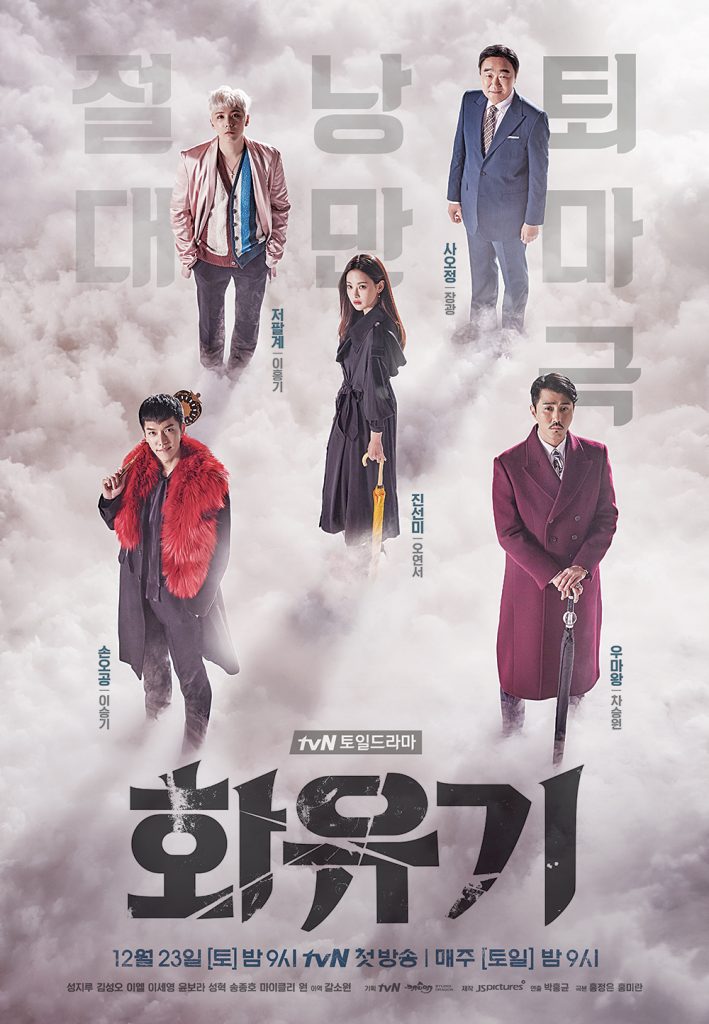A Korean Odyssey
A Korean Odyssey – A Mythical Journey Through Darkness and Redemption
*A Korean Odyssey*, a bold retelling of the classic Chinese novel *Journey to the West*, brings its mythological roots into a modern context, blending fantasy, drama, and comedy with a dark, supernatural edge. Set in 2017, the story revolves around Son O-Gong (a mischievous and powerful figure) and Woomawang (played by Cha Seung-Won), who find themselves entangled in an ongoing battle against evil forces while searching for the true light that can restore balance to their world.
The core of A Korean Odyssey lies in its ability to mix the mythological with the mundane. The gods, demons, and supernatural beings in the film exist alongside human characters in a world where evil lurks in every corner. The show’s premise is immediately intriguing, drawing viewers into a universe where age-old conflicts between good and evil manifest in everyday life. Son O-Gong, the rebellious and unpredictable antihero, stands at the heart of this conflict, constantly challenging Woomawang and the forces that attempt to control him.
The film’s strength lies in its reinterpretation of familiar mythological figures. Son O-Gong is portrayed with charisma and complexity, capturing the essence of a being torn between selfish desires and a reluctant sense of duty. He is a character driven by his desire for freedom, yet bound by fate to play a key role in the fight against evil. His journey is not just one of external conflict but also of personal growth as he learns to balance his selfish impulses with his greater purpose.
Opposite him is Woomawang, played brilliantly by Cha Seung-Won. Woomawang, also known as the Bull Demon King, is the perfect foil to Son O-Gong’s chaos. Where Son O-Gong thrives on disruption and defiance, Woomawang represents order and ambition. His portrayal brings gravitas and depth to the role of a demon who yearns for power but is also drawn into the complex web of emotions and relationships that define the human world. Their conflict, both literal and metaphorical, serves as the backbone of the narrative, driving much of the tension and intrigue.
The dynamic between Son O-Gong and Woomawang is one of the film’s greatest strengths. Their relationship is defined by mutual respect, rivalry, and a deep-seated animosity that stems from their respective roles in the cosmic order. While they are frequently at odds, there is a palpable tension that suggests their destinies are intertwined, making their interactions compelling and unpredictable.
Visually, A Korean Odyssey stands out for its impressive production design and special effects. The film takes full advantage of its fantasy setting, creating a dark, moody atmosphere that mirrors the internal and external struggles of its characters. From the shadowy alleyways where demons lurk to the grand, opulent spaces inhabited by divine beings, every scene is meticulously crafted to immerse the viewer in a world where the boundaries between the supernatural and the real are constantly blurred.
The cinematography further enhances the otherworldly tone of the film. The use of lighting, especially in scenes where evil forces are at play, creates an eerie and ominous mood, heightening the sense of danger that pervades the story. Meanwhile, the action sequences are well-choreographed, blending traditional martial arts with supernatural powers in a way that feels both exhilarating and visually captivating. Son O-Gong’s abilities, in particular, are portrayed with an energy that reflects his chaotic nature, while Woomawang’s power is depicted with a more controlled and imposing presence.
Thematically, A Korean Odyssey explores the dualities of light and darkness, good and evil, and freedom and responsibility. The characters, particularly Son O-Gong, embody these themes, often finding themselves at a crossroads between their personal desires and the larger cosmic battles they are forced to confront. The search for the “true light” in a world filled with evil becomes a metaphor not just for defeating external forces, but for the internal journey toward redemption and self-realization.
However, A Korean Odyssey is not without its lighter moments. The film injects humor and wit into the narrative, particularly through Son O-Gong’s irreverent and playful personality. His interactions with both divine beings and humans are often comedic, providing much-needed relief from the darker, more intense aspects of the story. The balance between humor and drama is well-maintained, ensuring that the film doesn’t become overly heavy or grim despite its dark subject matter.
In terms of character development, the film excels at providing its protagonists with compelling arcs. Son O-Gong’s journey from a selfish, rebellious figure to a reluctant hero is at the heart of the film’s emotional core. His relationship with the human world, particularly his growing connection with the people he is meant to protect, adds layers to his character and makes his ultimate choices feel meaningful and earned.
Woomawang’s arc is equally complex. While he initially appears as a straightforward antagonist, his motivations and desires are gradually revealed to be more nuanced. His struggle to reconcile his ambition for power with the responsibilities placed upon him as a leader creates an interesting tension that makes him more than just a villain. The film allows him moments of vulnerability, showing that even the most powerful beings in this universe are not immune to doubt and conflict.
One of the film’s most intriguing aspects is its treatment of fate and free will. Both Son O-Gong and Woomawang are powerful figures bound by cosmic rules, yet they constantly push against these boundaries in their quest for autonomy. The tension between their predetermined roles and their personal desires gives the film an existential edge, asking larger questions about destiny, choice, and the nature of power.
The film’s pacing is generally strong, although there are moments where the plot becomes bogged down in exposition or slower scenes that feel repetitive. However, the strong character development and action sequences keep the viewer engaged, and the overall arc of the story is compelling enough to overshadow any minor pacing issues.
Ultimately, *A Korean Odyssey* is a visually stunning and emotionally rich film that offers a fresh take on ancient mythology. Its exploration of light and darkness, along with its complex characters and high-stakes conflict, make it a compelling watch for fans of fantasy, drama, and mythology. The film deftly balances action, humor, and heart, creating an experience that is both entertaining and thought-provoking. As Son O-Gong and Woomawang search for the true light in a world filled with evil, viewers are invited to reflect on their own struggles with morality, identity, and the nature of redemption.

